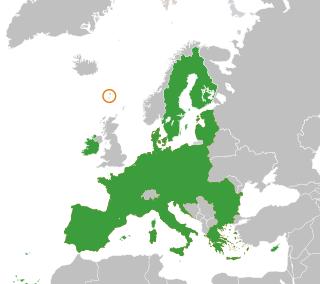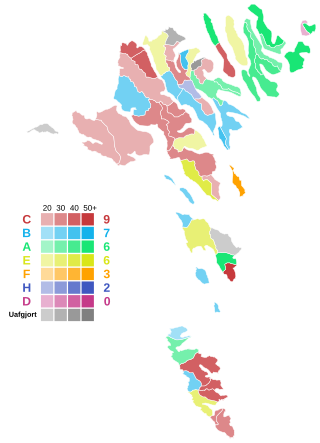The politics of the Faroe Islands, an autonomous country of the Kingdom of Denmark, function within the framework of a parliamentary, representative democratic dependency, whereby the Prime Minister of the Faroe Islands is the head of government, and of a multi-party system. The Faroe Islands are politically associated with the Kingdom of Denmark but have been self-governing since 1948. Executive power is exercised by the government. Legislative power is vested in both the government and the Løgting. The judiciary is independent of the executive and the legislature and the responsibility of Denmark.

The Løgting is the unicameral parliament of the Faroe Islands, an autonomous territory within the Danish Realm.

Jóannes Dan Eidesgaard is a former Faroese politician. He was the Prime Minister of the Faroe Islands from 2004, starting shortly after the general election of 20 January 2004, until 26 September 2008, when a new coalition took office. He served as Finance Minister from 1996 to 1998 and again from 2008 to 2011. He was a member of the Danish Folketing representing the Faroe Islands from 11 March 1998 until 20 November 2001.
Sjálvstýri is a liberal, autonomist political party on the Faroe Islands. It is currently led by the Mayor of Klaksvík, Jógvan Skorheim.

The Social Democratic Party is a social-democratic political party on the Faroe Islands, led by Aksel V. Johannesen.

The Faroese People's Party – Radical Self-Government is a pro-Faroese independence conservative and conservative-liberal political party on the Faroe Islands led by Beinir Johannesen. One of the four major parties, it has had eight seats in the Løgting since the 2019 election, making it the joint-largest party, but it has neither of the Faroes' seats in the Folketing.
The Faroese language conflict is a phase in the history of the Faroe Islands in the first half of the 20th century. It was a political and cultural argument between advocates of Faroese and Danish to serve as the official language of the Faroe Islands.
General elections were held in the Faroe Islands on 19 January 2008, the latest possible date. The Self-Government Party and the Centre Party gained a seat each while the Social Democratic Party lost a seat.
Same-sex marriage has been legal in the Faroe Islands since 1 July 2017. Legislation allowing same-sex marriage and adoption by same-sex couples was approved by the Løgting on 29 April 2016. The Danish Parliament approved the necessary legislative adaptations on 25 April 2017, and the law received royal assent on 3 May and went into effect on 1 July 2017.

The Faroe Islands, a self-governing nation within the Kingdom of Denmark, is not part of the EU, as explicitly asserted by both Rome treaties.
Early general elections were held in the Faroe Islands on 29 October 2011. Faroese law states that new elections must be held at least once every four years; however, either the Prime Minister (Løgmaður) or a majority of the members of the Faroese Parliament may call an election before the end of this period. The previous elections having been held on 20 January 2008, the latest date on which the next elections could have been held was 19 January 2012. However, the Prime Minister of the Faroe Islands, Kaj Leo Johannesen, announced on 27 September 2011 that elections would be held on 29 October 2011. He gave no particular reason for his decision.

Progress is a liberal, pro-Faroese independence political party on the Faroe Islands.

Women in the Faroe Islands are European women who live in or are from the Faroe Islands, a north Atlantic island group and archipelago that is under the sovereignty of the Kingdom of Denmark. Traditionally, Faroese women have a high standing in the society of Faroe Islanders. Legally, women of the Faroe Islands share equality with men. During the late 19th century, women in the Faroe Islands became wage-earners by participating in jobs such as fish processing and by becoming teachers. In 1915, they obtained women's suffrage. Eventually, Faroe Islander women were able to hold governmental positions.
The Second Cabinet of Kaj Leo Johannesen was the government of the Faroe Islands from 14 November 2011 until 15 September 2015 with Kaj Leo Johannesen from Union Party (Sambandsflokkurin) as Prime Minister, making a coalition between Union Party (Sambandsflokkurin), People's Party (Fólkaflokkurin), Self-Government Party (Sjálvstýrisflokkurin) and Centre Party (Miðflokkurin). It is a majority government and the first completely right winged government on the islands since 1985. In September 2013 the Self Governing Party left the coalition and the ministry was closed, after their minister Kári P. Højgaard had been sacked after much discussion about a subsea tunnel between the two largest islands: Streymoy and Eysturoy, Eysturoyartunnilin, which Mr. Højgaard planned to let a private Danish company called Copenhagen Infrastructure Partners make. The plans about making the tunnel were aborted, but in February 2014 all political parties of the Løgting including the independent excluded former member of the Social Democratic Party (Javnaðarflokkurin), Gerhard Lognberg, agreed on making two subsea tunnels: Eysturoyartunnilin and Sandoyartunnilin, both are planned to open in 2021 if everything works out as the politicians have planned, and they will be made by the Faroese government.

The Faroese independence movement, or the Faroese national movement, is a political movement which seeks the establishment of the Faroe Islands as a sovereign state outside of Denmark. Reasons for independence include the linguistic and cultural divide between Denmark and the Faroe Islands as well as their lack of proximity to one another; the Faroe Islands are about 990 km (620 mi) from Danish shores.
General elections were held in the Faroe Islands on 1 September 2015. Elections for the Danish Folketing were held beforehand on 18 June.
Sonja J. Jógvansdóttir is a Faroese journalist, politician, and establisher and coordinator of Samtak, the Faroese trade union center. Until 2015, she was a member of Social Democratic Party (Javnaðarflokkurin). She is a spokesperson for the rights of homosexual people and their rights in the Faroe Islands and was one of the establishers of LGBT Faroe Islands in 2011.

General elections were held in the Faroe Islands on 31 August 2019. The elections resulted in the defeat of Aksel V. Johannesen's coalition government consisting of the Social Democrats, Republic, and Progress. Following the elections, a new coalition government was formed by Union Party leader Bárður á Steig Nielsen, consisting of the Union Party, the People's Party and the Centre Party, which won 17 of the 33 seats.

Early general elections were held in the Faroe Islands on 8 December 2022. The opposition Social Democratic Party led by former Prime Minister Aksel V. Johannesen emerged as the largest party, receiving the largest vote share of any party since 1990, while Self-Government lost its Løgting representation for the first time since 1945.


















